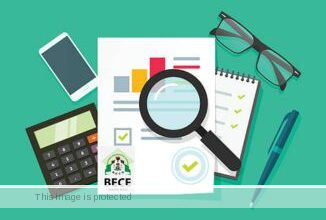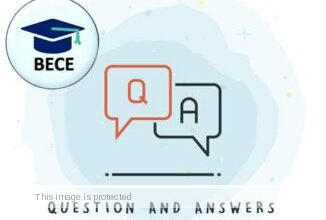BECE (JSS3) Junior WAEC Timetable 2024 (PDF Download)
Are you asking about the BECE junior WAEC timetable JSS3 pdf download in Nigeria?
If YES, then this is the only post to read.
Getting started…
BECE Junior WAEC JSS3 Timetable 2024
The Basic Education Certificate Examination (BECE) for 2024/2025 is scheduled to start on Monday, May 13th, 2024, and end on Friday, May 24th, 2024.
The National Examinations Council (NECO) will conduct the examination.
| Date | Paper Title and Subject | Duration | Time |
| Monday 15th May | Paper I: Objective: Arabic Language | 1hr | 10.00am – 11.00am |
| Paper II: Objective: Arabic Language | 1hr | 11.00am – 12.00noon | |
| Paper I: Objective: French Language | 1hr | 2.30pm – 3.30pm | |
| Paper II: Objective: French Language | 1hr | 3.30pm – 4.30pm | |
| Tuesday 16th May | Paper I: Objective: Basic Science and Technology (BST) | 1hr | 10.00am – 11.00am |
| Paper II: Objective: Basic Science and Technology (BST) | 1hr | 11.00am – 12.00noon | |
| Paper IV: Drawing: Basic Science and Technology (BST) | 45mins | 2.30pm – 3.15pm | |
| Wednesday 17th May | Paper I: Objective: English Studies | 1hr 20mins | 10.00am – 11.20am |
| Paper II: Objective: English Studies | 40mins | 11.20am – 12.00 noon | |
| Paper III: Essay: English Studies | 30mins | 2.30pm – 3.00pm | |
| Thursday 18th May | Paper I: Objective: History | 1hr | 10.00am – 11.00am |
| Paper II: Objective: History | 1hr | 11.00am – 12.00noon | |
| Paper I: Objective: Pre-Vocational Studies (PVS) | 1hr | 2.30pm – 3.30pm | |
| Paper II: Objective: Pre-Vocational Studies (PVS) | 1hr | 3.30pm – 4.30pm | |
| Friday 19th May | Paper I: Objective: Christian Religious Studies | 1hr | 10.00am – 11.00am |
| Paper I: Objective: Islamic Studies | 1hr | 10.00am – 11.00am | |
| Paper II: Objective: Christian Religious Studies | 1hr | 11.00am – 12.00noon | |
| Paper II: Objective: Islamic Studies | 1hr | 11.00am – 12.00noon | |
| Saturday 20th May | Paper III: Practical: Business Studies | 20mins | 10.00am – 10.20am |
| Monday 22nd May | Paper I: Objective: Cultural and Creative Arts (CCA) | 1hr | 10.00am – 11.00am |
| Paper II: Objective: Cultural and Creative Arts (CCA) | 1hr | 11.00am – 12.00noon | |
| Paper III: Practical: Cultural and Creative Arts (CCA) | 1hr | 2.30pm – 3.30pm | |
| Tuesday 23rd May | Paper I: Objective: Business Studies | 1hr | 10.00am – 11.00am |
| Paper II: Objective: Business Studies | 1hr | 11.00am – 12.00noon | |
| Paper I: Objective: Hausa L1 | 1hr | 2.30pm – 3.30pm | |
| Paper I: Objective: Igbo L1 | 1hr | 2.30pm – 3.30pm | |
| Paper I: Objective: Yoruba L1 | 1hr | 2.30pm – 3.30pm | |
| Paper I: Objective: Edo L1 | 1hr | 2.30pm – 3.30pm | |
| Paper I: Objective: Efik L1 | 1hr | 2.30pm – 3.30pm | |
| Paper I: Objective: Ibibio L1 | 1hr | 2.30pm – 3.30pm | |
| Paper II: Objective: Hausa L1 | 1hr | 3.30pm – 4.30pm | |
| Paper II: Objective: Igbo L1 | 1hr | 3.30pm – 4.30pm | |
| Paper II: Objective: Yoruba L1 | 1hr | 3.30pm – 4.30pm | |
| Paper II: Objective: Edo L1 | 1hr | 3.30pm – 4.30pm | |
| Paper II: Objective: Efik L1 | 1hr | 3.30pm – 4.30pm | |
| Paper II: Objective: Ibibio L1 | 1hr | 3.30pm – 4.30pm | |
| Paper I: Objective: Hausa L2 | 1hr | 3.30pm – 4.30pm | |
| Paper I: Objective: Igbo L2 | 1hr | 3.30pm – 4.30pm | |
| Paper I: Objective: Yoruba L2 | 1hr | 3.30pm – 4.30pm | |
| Wednesday 24th May | Paper I: Objective: Mathematics | 1hr 20mins | 10.00am – 11.20am |
| Paper II: Objective: Mathematics | 1hr 20mins | 11.20am – 12.40pm | |
| Paper III: Essay: Mathematics | 40mins | 2.30pm – 3.10pm | |
| Thursday 25th May | Paper III: Computer Practical: Basic Science and Technology (BST) | 45mins | 10.00am – 10.45am |
| Friday 26th May | Paper I: Objective: National Values Education (NVE) | 1hr | 10.00am – 11.00am |
| Paper II: Objective: National Values Education (NVE) | 1hr | 11.00am – 12.00noon |
Schools and Candidates Should Note
- Where the time on the question paper differs from the time on this timetable, the time on the question paper should be strictly adhered to.
- Practical in Business Studies and Basic Science and Technology (BST) should be in sets where the number of candidates is large, and the equipment cannot go round. However, the practical examination should not exceed 5.00pm. Computers can be used for Business Studies.
- Albinos and Blind Candidates are to be given 30mins extra time in all subjects.
- Blind Candidates must make use of NECO-supplied OBR Customized Braille Sheet for the Examination.
- Bringing into the examination hall electronic communication gadgets (programmable calculators, mobile phones, iPad tablets, smart wrist watches/glasses/pens) are strictly prohibited.
Basic Education Certificate Examination
The Basic Education Certificate Examination (BECE) is the main examination to qualify students for admission into secondary and vocational schools in Ghana, and Nigeria.
It is written after three years of junior secondary education.
The exam is administered by the Ghana Education Service under the Ministry of Education.
In Nigeria, it is administered by the state ministry of education in each state under the supervision of the National Examinations Council (NECO).
It is conducted annually in June (Ghana), May/June (Nigeria).
Tested Subjects (Ghana)
- English Language
- Mathematics
- Integrated Science
- Social Studies
- Religious and Moral Education
- French
(Optional)
- Ghanaian language (any Ghanaian language offered at a candidate’s school)
- Basic Design and Technology (Visual arts, Home Economics, Pre-Technical Skills)
- Information Communication and Technology
Tested Subjects (Nigeria)
- English Language
- Mathematics
- National Values Education (Including Civic Education, Social Studies and Christian/Islamic Religious Studies)
- Basic Science and Technology
- Cultural and Creative Arts
- Pre-vocational Studies
- Foreign Language (French or Arabic)
- Nigerian Language (Edo, Efik, Hausa, Igbo or Yoruba)
- Business Studies
- History
Registration
Schools approved by the Ghana Education Service or NECO are eligible to register students for the BECE each year.
The six-week entry period begins in October and ends in November.
Participating schools upload their Statement of Entries and School Choice Files via the Internet for processing.
Continuous Assessment Scores are submitted to the council on compact discs.
Candidate Grading and Selection
The examination comprises multiple-choice and written questions, and continuous (internal) assessment marks provided by the schools.
In Ghana, candidates are graded on a nine-point scale, with Grade 1 for highest performance and Grade 9 for lowest.
From 2017 to date, candidates in Nigeria have been graded on a non-linear 5 point scale from:
- A (Distinction)
- B (Upper Credit)
- C (Lower Credit)
- P (Pass)
- F (Fail)


